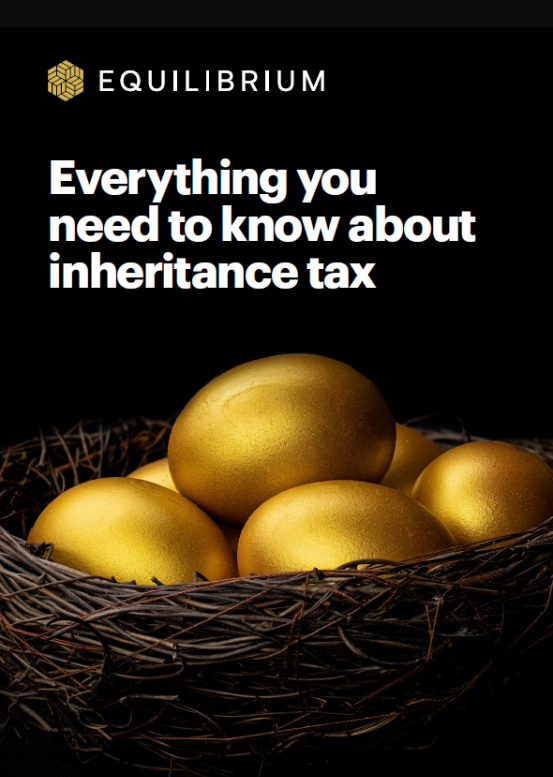Got a question about IHT? Let us answer it for you…
Fill in this simple form and someone will get back to you, or get in touch on 0808 156 1176 or by emailing askus@equilibrium.co.uk
New enquiries: 0161 383 3335
Existing clients: 0161 486 2250

In simple terms, your inheritance is what you leave behind once you pass. This is known as your ‘estate’ and will include your property, savings, investments, and potentially other assets too.
Inheritance tax (IHT) is a tax which is due on your estate (after inheritance tax allowances).
As Roy Jenkins (a former Chancellor of the Exchequer) once said (on inheritance tax) “broadly speaking, a voluntary levy paid by those who distrust their heirs more than they dislike the Inland Revenue.”
What is inheritance tax planning?
Inheritance tax planning is the process of finding out what your estate is worth and reviewing your ongoing inheritance tax liability.
The increasingly important driver for most of our clients is to be able to minimise the impact of inheritance tax and pass on as much wealth to loved ones and/or charity.
Effective inheritance tax planning will help achieve this and prepare your wealth for those people or causes closest to you. We can provide the necessary support to educate the next generations so that they are not overwhelmed by any future inheritance.
Inheritance tax must be paid before the remaining part of your estate can be distributed to your loved ones.
However, with a robust, ongoing plan, we can minimise your inheritance tax liability and ensure that your wealth is used to look after the people and causes you care about.
It’s important to plan efficiently due to certain inheritance tax thresholds, which may be available to reduce your taxable estate. The inheritance tax nil rate band is £325,000 per person or £650,000 for a married couple or civil partner.
In addition to this, anyone who owns a property at the time of death, which is their main residence, can benefit from an additional Residence Nil Rate Band (RNRB) of £175,000 per individual in the 2024/25 tax year.
This means that if your estate is being passed to direct descendants you could benefit from a total nil rate band of £500,000 for an individual or £1 million for a couple.
For the latest inheritance tax thresholds, rules and allowances, visit the GOV.UK website here.



Our free downloadable the guide covers the allowances and exemptions as well as how best to approach your inheritance tax and intergenerational plan.
DownloadWe need to find out what your current inheritance tax liability is. Don’t worry, we will do all the calculations for you by gathering all the requisite information.
We also consider what your future IHT liability is likely to be and whether it will resolve itself over time or get worse.
There are ways we can help to mitigate your IHT liability so you can pass on more of your wealth to the people and/or causes you love most.
Remember, the earlier you start your plan, the better the outcome will be.
Our aim is to understand you as you are the centre of this plan.
We know everybody is unique therefore we explore your values, attitudes, and beliefs around money.
Based on your hopes and wishes for the future, we guide you through a detailed lifetime cashflow forecast, adding all the information we know about you.
The results can often be surprising and from our experience, it has enabled many of our clients to have more confidence and financial freedom to live the life they want.
Your family are equally important in this process.
Knowing the needs of your individual family members can help determine when to pass on your wealth at a time which benefits them most.
We work with you to create a family roadmap, so the right people receive the right amount of money at the right time in accordance with your wishes and not at the cost of you.
The power of conversation should never be underestimated.
The final step of the process is to create a bespoke strategy for you.
You may wish to involve your loved ones. They are more than welcome to come along and join a meeting, during or after the planning process.
There is no right or wrong way as everyone’s circumstances and family dynamics are different.
Consider sharing your plan with someone you trust as they may be the one tasked with dealing with your estate, at a time which is especially difficult for them.
The 7-year rule in inheritance tax means there are no taxes to pay on gifts if you live for 7 years or more after giving them, unless the gift is part of a trust.
If you die within 7 years of giving a gift, inheritance tax will be due however this will depend on when the gift was made. Gifts given within 3 years before death require beneficiaries to pay inheritance tax of 40%.
Gifts given within 3-7 years before death may benefit from ‘taper relief’ and could therefore be taxed on a sliding scale. Taper relief is only available on gifts which were valued above the nil rate band (currently £325,000)
It is worth noting, there is no inheritance tax to pay on gifts to surviving spouses, if they live in the UK, and you are legally married or in a civil partnership.
There are also various gifting allowances to take advantage of each year which are immediately exempt from inheritance tax, such as the annual gifting allowance, small gifts, gifts in consideration of marriage, charitable and political gifts, and gifts out of income.
If you’re thinking about making a gift(s) and/or you would like to know more about the 7-year rule of gifting and also the lesser known 14-year rule of gifting, please contact us using the form below.
Inheritance tax planning is the process of valuing your estate and reviewing your ongoing inheritance tax liability.
Effective inheritance tax planning will achieve this however, it may not necessarily lead to enhancing the lives of those closest to you.
Most financial plans will thoroughly consider inheritance tax – in other words how best to prepare your wealth for your children.
What is often overlooked, is intergenerational planning – or essentially, how to prepare your children for your wealth.
We look at the wider picture of where and who you want your wealth and/or estate to go to.
Our priority is to work with you to explore the wishes for your wealth. This often involves working with your emotions, deep-rooted beliefs and unspoken (or even unconscious) conflicts.
Only by doing this can we ensure the right people get the right money at the right time.
Fill in this simple form and someone will get back to you, or get in touch on 0808 156 1176 or by emailing askus@equilibrium.co.uk

You may be concerned what impact IHT will have on you and your family or even whether there’s something you can do to mitigate this now.
Read our insightful article on:

You may want to protect your money by gifting to your children or a chosen charity.
‘Double dips and top tips’ tells the story of how a few simple changes made a big difference to the lives of every generation.

Making pension contributions to your kids and grandkids can make a huge impact to their retirement if you start early.
Our article on ‘Future fortunes’ explains why you should grasp the nettle and set up a pension for a child/grandchild today.

When families have open discussions about their finances, the results can be life changing. Discover how talking about money can unlock the most value from your wealth.
Read more
Discover five top tips to prepare your children for their inheritance and make sure you and your loved ones get the most out of your money and maximise its impact.
Read moreInheritance tax can often seem confusing. Our glossary gives you a helpful explanation to each of the common terms.
A person who is appointed by the courts to administer a deceased person’s estate in England, Wales, and Northern Ireland; usually where there is no will or they are not named in the will.
This is a relief from Inheritance Tax which is due on the transfer of agricultural property. The relief applies to the agricultural value of the asset only i.e., the value the property has if it is used for agriculture only and not sold for alternative use. Rates of 50% and 100% apply on certain qualifying criteria.
An application for the legal right to deal with someone’s property, money, and possessions, in other words their estate.
A person or organisation which receives property, or gets some benefit from, a will, intestacy, or trust.
This relief reduces the value of a business or its assets when working out how much inheritance tax is due. Rates of 50% and 100% apply on certain qualifying criteria.
These are lifetime transfers of value which are immediately chargeable to inheritance tax (on any amount over the nil rate band) unless it is an exempt transfer or a potentially exempt transfer. Examples include gifts to companies, gifts to relevant property trusts.
Personal possessions or property other than freehold land.
A person who relies on another, such as a family member, for financial support.
A person receiving the gift.
A person who is giving a gift.
Is a means of retaining use of your home, whilst also obtaining a lump sum or a steady stream of income, using the value of the house. Interest is added to the amount released and will compound over time.
This is defined as property, savings and any other assets after debts and funeral expenses have been deducted.
A person who administers a deceased person’s estate in England, Wales and Northern Ireland and is named in the will.
This can be used to set out your funeral wishes; direct who you wish to give your personal chattels; explain why you have a excluded a person from benefiting in your Will. It can also be used to let the scheme administrator of your pension(s) know who you want to receive the death benefits.
The voluntary transfer of property from one person (the donor) to the other (the donee) without any consideration of its value.
Where property is transferred to a beneficiary, but the donor/transferor continues to benefit from it following the transfer. For example, a person may gift their home to their children/grandchildren but continue to live in the property.
Where property is given away during a person’s lifetime which has the effect of removing value from their estate.
This involves the transfer of property in its entirety from one person to another with no conditions attached.
A person has a £3,000 ‘gift allowance’ each year which means any gift of assets or cash up to a total value of £3,000 can be made without it being added to the estate for the purposes of inheritance tax.
This document allows the executor(s) to start dealing with the estate.
This is a tax, after accounting for any reliefs such as the Nil Rate Band or Residence Nil Rate Band available (see below), which is paid by the executors of the estate before any distributions are made.
The tax-free threshold is £325,000. Any amount above this threshold is liable to IHT. This has been frozen until 2028.
Get in touch with us today by completing the form. Alternatively, don't hesitate to call us using the numbers below.
New Enquiries: 0161 383 3335
Existing clients: 0161 486 2250
If you'd like a call from one of our financial planners please complete the form below.
In order to get the best viewing experience of this website, we recommend downloading one of the browsers below: